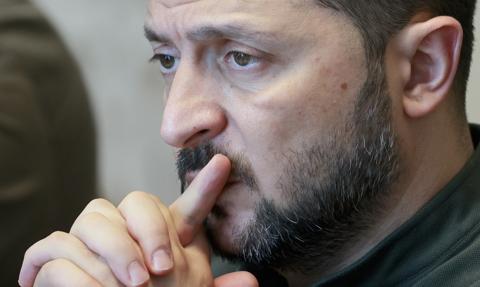It's been a tough few weeks for the country's new Prime Minister. Faced with the collapse of Law and Justice's (PiS) majority coalition with Civic Platform (PO), Kazimierz Marcinkiewicz had to rely on a second-choice minority government for the raw materials of his cabinet. But, rather than taking the flat-pack option, and simply replacing the seats vacated by his predecessor, Marcinkiewicz has rebuilt the government according to his own designs and knocked down a few ministerial walls in the process.
Sixteen new Ministers will oversee departments, while Zbigniew Wasserman will coordinate the activities of the intelligence services as a member of the new cabinet. The Ministry of Economy and Labor was split in two, the Infrastructure Ministry was rebranded as the Transport and Housing Ministry and a new Regional Development Ministry was established.
But before the ministers can pick out wallpaper for their new offices, the cabinet will have to win the approval of parliament on Thursday. Failed presidential candidate Donald Tusk said his party, Civic Platform, will vote against the line-up, but populist parties have already voiced their support for the new cabinet. Self-defense leader Andrzej Lepper has become a latter-day kingmaker, and thrown his weight behind the proposed Ministers. Royal favors come at a price, however, and Lepper has the cabinet over a barrel, saying that any moves towards economic liberalism will mean an immediate withdrawal of support.
Here, the WBJ explores the profiles of the men and women that Marcinkiewicz hopes will lead Poland from the front.
Ludwik Dorn, Interior Minister
Dorn, 51, is a sociologist, and one of the closest allies of conservative PiS party leaders Jarosław and Lech Kaczyński. Dorn, who gave Law and Justice its name, cooperated with the anti-communist opposition from the early 1970s, and wrote for the underground press. As a Sejm Deputy he was the author of the anti-corruption sections in the act dealing with political parties. He also strongly opposed the implementation of IT services in the Interior Ministry by Krzysztof Krauze's Prokom.
Dorn's priority as Interior Minister is to overhaul the police force by completely changing the senior staff. He has already sacked the heads of the special services and promised to nominate new regional and national heads of the police force within days of taking office.
Teresa Lubińska, Finance Minister
Lubińska, 53, is head of the finance department at the University of Szczecin and is Marcinkiewicz's former economics professor. Last year she was appointed to a council advising the outgoing Finance Minister. She is one of the richest members of the Szczecin city council and her holdings are estimated at some zł.1.73 million. She invests her money in deposit accounts, investment funds and real estate.
Lubińska wants to adopt a gradual approach to reducing the budget deficit. "In public finances nothing should happen rapidly. People are sick and tired of the word 'reform'. All changes need to be announced at least two years in advance so that both society and the Ministry have time to digest the idea," she said. In spite of the new government's pre-electoral promises, Lubińska announced that there would be no expenditure cuts in the budget and is pushing for increase in 2005's budget deficit.
Stefan Meller, Foreign Affairs Minister
Stefan Meller, 63, is a history professor and tested diplomat who, before taking his cabinet position, was Poland's Ambassador to Moscow and previously to Paris. He speaks fluent English, French, German and Russian. Meller will also take control of European Union affairs after the liquidation of the Office of the Committee for European Integration (UKIE).
Piotr Woniak, Economy Minister
Woniak, 49, is a geologist and the economic expert for PiS. From 1992 to 1996 he served as a trade counselor for the Polish Embassy in Canada. He advised a previous right-wing cabinet on infrastructure and was deputy chief of gas group PGNiG, strongly criticizing its privatization shortly before the elections. Woniak also served as an expert to the PKN Orlen Investigative Commission.
According to Woniak, floating PGNiG on the Warsaw Stock Exchange was a bad decision since it enabled the Russian Gazprom to buy the company's shares and facilitated their access to company information. Woniak's priority as the new Economy Minister is to improve Poland's energy security by diversifying suppliers.
Andrzej Mikosz, Treasury Minister
Mikosz, 40, is a lawyer specializing in capital-market issues and a former member of the Polish Securities and Exchange Commission. He fought for minority shareholders' rights in several high profile cases, such as Stomil Olsztyn vs. Michelin and Wirtualna Polska vs. Telekomunikacja Polska. He worked for Weil Gotshal & Manges and later the legal firm Lovells. He was responsible for legal issues related to the public offers of companies such as Amica, Wronki, Wilbo Seafood, PKN Orlen and Netia Holdings.
As Treasury Minister, Mikosz is in charge of privatization. When asked about his plans as Minister, he said: "I'm a privatization specialist and not the person to impede it." One of the first cases he is planning to deal with is the conflict surrounding the privatization of PZU - the Polish state-controlled insurance group.
Krzysztof Michałkiewicz, Minister of Labor and Social Policy
Michałkiewicz, 52, is a sociologist from the Catholic University of Lublin. The PiS member of parliament also served as Deputy Mayor of Lublin. For his social work he was awarded a Lumen Mundi medal by Archbishop Józef Życiński.
His main plans as Labor Minister include lowering the unemployment rate through the creation of new jobs. Michałkiewicz also plans to draft a special program of social policy for young people, covering the problems of unemployment among graduates and meals for schoolchildren.
Jerzy Polaczek, Transport and Housing Minister
Polaczek, 44, is a lawyer and PiS' leader in the industrial Silesia region, as well as the founder of the Regional Institute in the Silesian city of Katowice. In the previous Sejm term, Polaczek was vice president of the Infrastructure Committee.
Among the main issues Polaczek said he would tackle as Transport and Housing Minister is speeding up the construction of highways in Poland and the developiment of housing. The biggest burden he carries is delivering PiS' outlandish pre-electoral promise to build three million new flats within the next eight years.
Zbigniew Religa, Health Minister
Religa, 66, is a heart surgeon turned center-right politician. Religa ran for President in the recent elections, but later withdrew from the race in order to back Lech Kaczyński's main opponent, PO's Donald Tusk.
Religa's nomination is perceived as a goodwill gesture aimed at helping to push PO back to the negotiating table after talks collapsed over the cabinet line-up and economic policy.
Radosław Sikorski, Defense Minister
Sikorski, 42, is an Oxford-trained international affairs expert, and served as Deputy Defense and Deputy Foreign Minister in the previous right-wing cabinet. One of the few senior PiS officials with international experience, he worked as a foreign correspondent for The Spectator and The Observer and also won an award in the World Press Photo competition in 1988. In 1990, he became Rupert Murdoch's advisor for investments in Poland.
Sikorski is regarded as having close ties to the US Republican party, and was a fellow at the American Enterprise Institute, a conservative Washington think tank. His research areas focused mainly on trans-Atlantic affairs.
Zbigniew Ziobro, Minister of Justice
Ziobro, 35, is a lawyer from Kraków and was the leader of Lech Kaczyński's winning presidential campaign. He was Deputy Minister of Justice and a star of the first investigative commission in the Rywin vs. Agora case. After a seven-hour-long hearing, the then-Prime Minister Leszek Miller called him a "zero." However, it was Ziobro's report that was adopted by the Sejm.
He is the man behind PiS' proposal to create a special 'truth and justice' commission for tracking all scandals and corruption in post-communist Poland.
Grażyna Gęsicka, Development Minister
Gęsicka, 54, is a sociologist and was a Deputy Labor Minister where she was responsible for employment-enhancing programs funded by Phare (the EU's economic support program for the CEE region) and the World Bank. Gęsicka was also deputy president of the Polish Agency for Enterprise Development (PARP). Previously, she represented PO, not PiS, in discussions between the two groups over absorbing EU funds.
Krzysztof Jurgiel, Minister of Agriculture
Jurgiel, 52, is an engineer with experience in local administration. He was Mayor of Białystok, a Sejm Deputy and a Senator for PiS. Jurgiel is a board member of the Catholic Families' Association. He also coordinated PiS' agricultural program.
Jan Szyszko, Environment Minister
Szyszko, 61, is a right-wing politician and specialist in ecology. He served as Environment Minister in the former right-wing government headed by Jerzy Buzek, where he designated wolves as a protected species throughout Poland. In line with the conservatives' program, Szyszko opposes the privatization of state forests.
Michał Seweryński, Minister of Education and Science
Seweryński, 66, a professor at the University of Łód, is a specialist in Polish and international labor law. He cooperated with Mirosław Handke, the Education Minister in the former right-wing government, and prepared two draft laws on higher education, neither of which were adopted. Their provisions included making university education partly free of charge. Seweryński is an active member of several Catholic associations.
Tomasz Lipiec, Minister of Sport
Lipiec, 34, is a distance walker who has also worked as a sports journalist. Robert Korzeniowski, the Olympic gold-medal walker, was the only one to outpace him at the distance of 50km. Lipiec graduated from the Warsaw School of Economics and was a director of the Warsaw Center for Sports and Recreation. He strongly opposed the idea of installing floor heating in the VIP section of the Polonia Stadium, labeling the idea "exaggerated opulence."
Kazimierz Ujazdowski, Minister of Culture and National Heritage
Ujazdowski, 41, a lawyer, was one of the founders of PiS in 2001 and the party's foreign affairs expert. He served as the Minister of Culture in a previous right-wing government but handed in his resignation after Lech Kaczyński was forced out of his position as Minister for Justice. He is a co-founder of the Institute of National Heritage and the Chopin Institute.
Zbigniew Wasserman, Intelligence Services Coordinator
Wasserman, 58, is a hard-nosed prosecutor who entered parliament in 2001. He strongly advocats cleansing the government services of former communists. He has already announced the liquidation of the Military Information Services (WSI). According to PiS leader Jarosław Kaczyński, thanks to Wasserman the pathological links between business, politics, organized crime and the intelligence services will be eradicated. (Reuters)
The new cabinet is proving tough as teak. The eclectic mix of old hands and relative novices has already provoked controversy by tabling radical proposals on a number of fronts. However, with Civic Platform firmly entrenched in the opposition benches, this week's confidence vote in the Sejm will be a stern test for the would-be Ministers.


























































